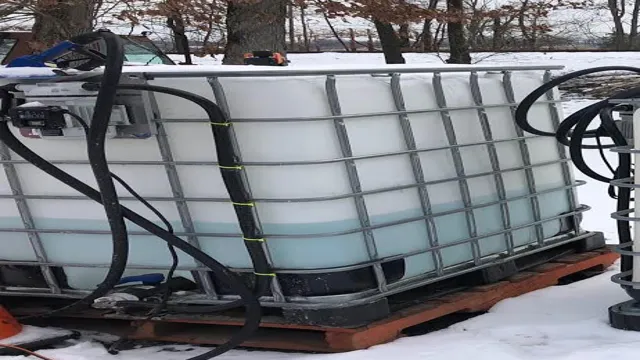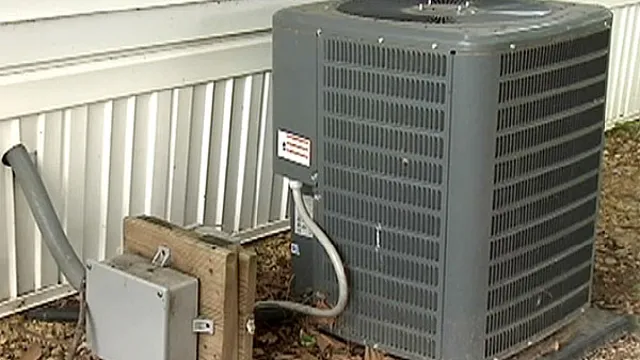Winter has arrived, and the temperatures are dropping fast! As we all try to keep ourselves warm and cozy inside our homes, it’s important to consider the impact of the cold weather on our HVAC (Heating, Ventilation, and Air Conditioning) systems. One question that often arises in this context is whether freon can freeze in cold weather. For those of you who are unfamiliar with what freon is, it’s a refrigerant that is commonly used in air conditioning systems to cool the air.
However, in extremely cold weather, the question arises as to whether freon can freeze and cause damage to the HVAC system. In this blog post, we will be discussing whether freon can freeze in cold weather and what steps you can take to prevent any damage to your HVAC system.
What is Freon?
Freon is a type of refrigerant that is commonly used in air conditioning and refrigeration systems. It works by absorbing heat from the surrounding environment and then releasing it outside. While freon is designed to operate under extreme temperatures, it can still freeze in very cold weather.
When this happens, the freon becomes solid and can no longer circulate through the system properly. This can cause the system to malfunction or stop working altogether until the freon thaws. It is important to keep in mind that freon should never be handled or disposed of improperly as it is harmful to the environment.
If you suspect a problem with your air conditioning or refrigeration system, it is best to contact a professional for assistance rather than attempting to fix the problem yourself. In conclusion, while freon is a useful and necessary component in many HVAC systems, it can freeze in cold weather, causing potential issues if not handled properly.
Chemical Properties of Freon
Freon is a colorless, odorless gas that is commonly used in refrigeration and air conditioning systems. It is a brand name for a group of chlorofluorocarbons (CFCs) and hydrochlorofluorocarbons (HCFCs) that are known for their low toxicity and non-flammability. Despite being widely used, Freon poses a significant threat to the environment, as it has been found to contribute to the depletion of the ozone layer.
This is due to its chemical properties, as CFCs and HCFCs are known to contain chlorine and bromine atoms that break down ozone molecules in the stratosphere. As a result, the Montreal Protocol was established in 1987 to phase out the use of CFCs and HCFCs. While alternative refrigerants have been developed, such as hydrofluorocarbons (HFCs), they also have adverse effects on the environment, making the search for eco-friendly refrigerants an ongoing challenge.

How Does Freon Work?
Freon, also known as refrigerant gas, is a common substance used in cooling and air conditioning systems. But can Freon freeze in cold weather? The answer is yes! Just like any other substance, Freon has a freezing point that can be reached when it is exposed to extremely low temperatures. When Freon reaches its freezing point, the gas can turn into a liquid and cause damage to the cooling system.
This is why it’s so important to maintain and check your HVAC system regularly during the colder months. By keeping your system properly maintained, you can prevent issues like frozen Freon and ensure that your cooling system operates effectively and efficiently throughout the year. So if you’re in a cold climate, make sure to stay on top of your HVAC maintenance and keep an eye out for any signs of frozen Freon.
A/C System Overview
When it comes to our air conditioning system, one of the key components that keeps it running is Freon. But how does Freon work exactly? Well, Freon is actually a type of refrigerant that works by absorbing heat from the air inside your home and releasing it outside. The process starts when the compressor in your A/C unit compresses the refrigerant into a high-pressure gas, which then flows through the condenser and cools down.
As it cools, it turns into a liquid and flows through the evaporator coil, which is located inside your home. The liquid Freon then absorbs the heat from the air inside your home, cooling it down, and returning to a gas state as it flows back to the compressor. This continuous cycle keeps your home cool and comfortable.
However, it’s important to note that Freon can be harmful to the environment if not handled properly, so it’s crucial to have a professional HVAC technician take care of any maintenance or repairs that may involve the refrigerant.
Freon’s Role in Cooling
Freon When it comes to cooling, Freon is a well-known name in the game. But just how does Freon work? Essentially, Freon is a type of refrigerant that is used in cooling systems to facilitate the transfer of heat. As Freon is cycled through the system, it transitions from a gas to a liquid and back again.
This transformation allows it to absorb heat from one location and release it in another, effectively cooling the surrounding area. By controlling the flow of Freon, cooling systems can maintain a consistent temperature and keep us comfortable. However, it’s worth noting that while Freon is highly effective, it is also a fluorocarbon that can be harmful to the environment.
As a result, many modern cooling systems have transitioned to more eco-friendly refrigerants.
What Happens to Freon in Cold Weather?
Have you ever wondered what happens to freon in cold weather? Well, to answer the question, freon can actually freeze in extremely cold temperatures. Freon, which is the most common refrigerant used in air conditioning systems, has a boiling point of -19 degrees Celsius.
However, if the temperature drops below this point, then the freon may start to freeze. When this happens, the freon can no longer circulate through the system properly, which can lead to a number of issues including decreased efficiency, increased energy consumption, and even damage to the compressor. It’s important to make sure that your air conditioning system is properly insulated and protected from the cold.
Additionally, if you suspect that your freon has frozen, it’s best to contact a professional to assess the situation and make any necessary repairs.
Behaviour of Freon at Low Temperatures
Freon Freon is a common refrigerant used in air conditioning systems around the world. But have you ever wondered what happens to Freon in cold weather? Despite its effectiveness in keeping our indoor environments cool, Freon actually behaves quite differently when exposed to low temperatures. When the temperature drops below freezing, Freon starts to convert from a gas to a liquid state.
This is because the evaporator coils in which Freon circulates get colder in cold weather. As a result, the pressure within the coils decreases, forcing Freon to change from a gas to a liquid. This can cause a number of problems for your air conditioning system, including reduced efficiency and potential damage if the liquid Freon freezes within the coils.
However, with proper maintenance and care, your air conditioning system can continue to operate smoothly even in extreme temperatures.
Effects on A/C System
Freon, Cold Weather, A/C System When temperatures drop, your A/C system may start to show signs of strain. One of the effects of cold weather on an A/C system is the impact it has on the refrigerant or Freon. Freon is the lifeblood of your A/C system since it helps to absorb heat from the air indoors, ultimately cooling your living space.
But in cold weather, it can cause issues if it’s not checked and maintained regularly. When the temperature drops, the Freon in your A/C system can become thick and sluggish, making it more difficult for it to flow through the system and absorb the heat. This can lead to malfunctions and damage to the A/C unit, resulting in costly repairs.
To avoid these problems, it’s essential to schedule regular maintenance for your A/C system before cold weather sets in. A professional technician can inspect the Freon levels, ensuring it’s at its optimal state to operate efficiently regardless of the outside temperature. During such maintenance, the technician can also check for leaks and other issues that may affect the performance of your A/C system.
Overall, it’s vital to take care of your A/C system all year round, not just when the temperatures rise.
How to Prevent Freezing of Freon?
If you are wondering whether freon can freeze in cold weather, the answer is yes. Freon, the refrigerant commonly used in air conditioning and refrigeration systems, can freeze at very low temperatures. In fact, the freezing point of freon depends on its specific type, with some types freezing at temperatures as high as -20 degrees Fahrenheit.
When freon freezes, it can cause damage to the air conditioning or refrigeration system, leading to costly repairs. To prevent this from happening, it is important to use the right type of freon for your specific system and to ensure that your system is properly insulated and maintained. It is also a good idea to have your system serviced regularly by a professional to detect and address any potential issues before they become major problems.
By taking these proactive steps, you can ensure that your air conditioning or refrigeration system runs smoothly throughout the winter and beyond.
Insulation, Maintenance & Repairs
If you want to prevent your Freon from freezing, there are a few things you can do. First and foremost, make sure your insulation is up to par. This will help keep the temperature stable and prevent any freezing from happening.
Another thing you can do is perform regular maintenance on your system. This will help ensure that everything is in good working order and reduce the likelihood of freezing occurring. Finally, if there is an issue with your system that is causing freezing, be sure to have it repaired as soon as possible.
Ignoring the issue will only make things worse and can even lead to serious damage to your system. By following these steps and staying on top of your system’s maintenance, you can help prevent freezing of your Freon and keep your HVAC system running smoothly.
Conclusion: Protect Your A/C System From Cold Weather
In conclusion, the belief that freon cannot freeze in cold weather is largely a myth. While it is true that freon has a lower freezing point than water, it is not immune to freezing in extremely cold temperatures. So the next time someone tries to argue that freon can withstand any weather conditions, just remember that even the mighty freon can succumb to the wrath of mother nature’s icy grip.
“
FAQs
What is Freon used for in air conditioning systems?
Freon is a refrigerant used in air conditioning systems to help cool indoor air.
Can Freon freeze in cold weather?
Yes, Freon can freeze in extremely cold temperatures, which can cause damage to the air conditioning system.
Is it necessary to refill Freon in an air conditioning system?
It is not necessary to refill Freon in an air conditioning system unless there is a leak or malfunction in the system.
How can I tell if my air conditioning system needs more Freon?
If the air coming from the vents is not as cool as it should be or if the air conditioning system is not functioning properly, it may be a sign that more Freon is needed.
Can Freon be harmful to the environment?
Yes, Freon can contribute to ozone depletion if it is released into the atmosphere. It is important to properly dispose of Freon and not release it into the air.

